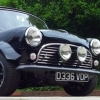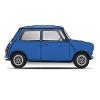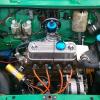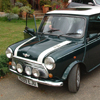
Eezibleed
#16

Posted 24 September 2012 - 02:39 PM
#17

Posted 24 September 2012 - 03:06 PM
Start further away from the master and work closer. So usually NS rear, OS rear, NS front, OS front.
I'll second that. Did mine, didn't notice any change in feel or performance but felt better that the brake fluid was brake fluid colour and not yucky browny black anymore!
#18

Posted 24 September 2012 - 03:20 PM
I find the second time around gets a better 'feel' even though no air is pushed out.
#19

Posted 24 September 2012 - 08:48 PM
I have been using eesibleeds for about 30 years, always on properly overhauled systems with no cylinder bore wear, and have never, ever has the slightest hint of a problem. If the cylinder is so worn that it will allow 20 psi to invert the seal lip, the seal is going to blow out under heavy braking (approaching 2000 psi).
#20

Posted 25 September 2012 - 12:35 PM
You will only damage the seals if the master cylinder bore is already dangerously worn, and the lip of the seal inverts. There is absolutely no chance whatsoever of that happening if the master cylinder is fit for use. You will not damage the seals by using excessive pressure, but there is a very real danger of blowing the cap off the master cylinder, or on some models ejecting the reservoir from the cylinder, either of which will spray fluid everywhere, which can be dangerous to you and your paintwork. Brake fluid in the eyes can result in blindness, so I am told, and it ruins paint.
I have been using eesibleeds for about 30 years, always on properly overhauled systems with no cylinder bore wear, and have never, ever has the slightest hint of a problem. If the cylinder is so worn that it will allow 20 psi to invert the seal lip, the seal is going to blow out under heavy braking (approaching 2000 psi).
I wonder why they say no more than 20psi to bleed it if such high pressures occur under normal breaking.
#21

Posted 25 September 2012 - 12:57 PM
You will only damage the seals if the master cylinder bore is already dangerously worn, and the lip of the seal inverts. There is absolutely no chance whatsoever of that happening if the master cylinder is fit for use. You will not damage the seals by using excessive pressure, but there is a very real danger of blowing the cap off the master cylinder, or on some models ejecting the reservoir from the cylinder, either of which will spray fluid everywhere, which can be dangerous to you and your paintwork. Brake fluid in the eyes can result in blindness, so I am told, and it ruins paint.
I have been using eesibleeds for about 30 years, always on properly overhauled systems with no cylinder bore wear, and have never, ever has the slightest hint of a problem. If the cylinder is so worn that it will allow 20 psi to invert the seal lip, the seal is going to blow out under heavy braking (approaching 2000 psi).
I wonder why they say no more than 20psi to bleed it if such high pressures occur under normal breaking.
I think it gets messy.
#22

Posted 25 September 2012 - 02:52 PM
0 user(s) are reading this topic
0 members, 0 guests, 0 anonymous users

















